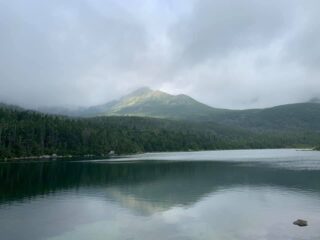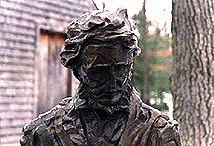 “It is not a bad symbol of that long wandering, I thought again – the human hand that has been fin and scaly reptile foot and furry paw. If a stone should fall (I cocked an eye at the leaning shelf above my head and waited, fatalistically) let the bones lie here with my message, for those who might decipher it, if they come down late among us from the stars.
“It is not a bad symbol of that long wandering, I thought again – the human hand that has been fin and scaly reptile foot and furry paw. If a stone should fall (I cocked an eye at the leaning shelf above my head and waited, fatalistically) let the bones lie here with my message, for those who might decipher it, if they come down late among us from the stars.
Perhaps there is no meaning at all, the thought went inside me, save that of the journey itself, so far as man can see. It has altered with the chances of life, and the chances brought us here; but it was a good journey – long, perhaps – but a good journey under a pleasant sun. Do not look for the purpose. Think of the way we came and be a little proud. Think of this hand – the utter pain of its first venture on the pebbly shore.
Or consider its later wanderings.”
An excerpt from anthropologist/essayist Loren Eiseley’s “The Slit” in The Immense Journey.
Eiseley’s statement is a long way from the motivational poster’s “Success is a journey, not a destination,” but I hear a similar optimism for those of us who are still not “there,” there being wherever we thought we ought to be, socially, financially, intellectually – whatever criteria we choose to measure own inadequacies. Eiseley had the advantage of a thousand years’ perspective, and, if I may, a tenure-track teaching position, which is a comfortable place from which to pontificate, but that does not exempt him from the anxiety of eventual death – he “waited, fatalistically”—nor the consideration that “perhaps there is no meaning at all.”
The last time I felt that way, I freaked out and moved to Mexico. I was twenty at the time, and I was just beginning to face the possibility that my emotional reactions to the “utter pain” of my undergraduate existence had less to do with teenage angst and more to do with duller, broader words like “anxiety” or “dysthymia.” In an effort to get away from some recriminating self-talk – “Why didn’t you get that internship?” “What did you do to drive him away?” “When will you pull yourself together?” – I got out of my country, and, more importantly, my language.
I was a fool in the Spanish-speaking world. My pronunciation was so atrocious that when I pulled out my Spanish 101 stock phrase, “Dónde está el baño” – where is the bathroom – I eventually had to write it on a piece of paper. I spoke almost exclusively in the present tense. And it could have been the double punctuation, that upside-down exclamation mark at the end of sentence fragments, but I got a little giddy about it. “¡Aguacates!” I squealed, rewarding myself for remembering the term by purchasing four at the supermarket. “Si. Yyyyy… ! queso!” giggled my friend Rinna, completing our meal.
On the plane ride back from Mexico, I was writing a letter to a friend from Ireland. This is a method I use to dilate my travels, both psychologically and geographically. These letters were the first time in several years that I mentioned joy, fecundity, or that I saw the Lion King chorus’s “There’s more to see than can ever be seen, more to do than can ever be done” as a means of feeding my curiosity, rather than fueling my disappointment. Years later, as I penned a letter to a cousin in Ohio from the beginning of a month-long journey on Argentina’s buses —
Breaking news: Argentina is disappointing me by not scoring the first goal in their World Cup Match about Germany. C’mon guys! –
– I told her that the surest way I’d found to deal with my low moods was to provide myself with plenty of sunlight when I was feeling drained, and physical momentum when I was feeling impotent. “So, basically, the way I escape my own negativity is by walking quickly, in the sun,” I mused. But when my self-frustration was strong enough to catch up to me, it was time to get on the bus.
Halfway through the fourteen-hour ride to Salta, I realized that the clock had passed midnight, and it was my birthday. I readjusted my makeshift pillow, ignored the giggling couple under the blanket on the seat next to me, and looked out the window, at the strange countryside that would be entirely another in the morning. I thought of how I came to be there – the scholarship, yes, but also all of the failed job applications, the unsecured internships, the panic of my junior year, the panic attacks I found waiting for me on my first venture out of the country– and I was proud.
That would all be challenged again once I landed back in the States, where a recession, and the scale of this country, not to mention its reliance on carbon-credit-burning cars, hampered my travels and challenged my sense of self-worth. I compensate by reading a lot – psychological travel, you know – and running when I miss the illusion of progress. I go to New York on weekends when I am particularly claustrophobic, and come home with a new take on Vietnamese sandwiches (yes!) or a story about how I accidentally ended up in last weekend’s Gay Pride Parade.
Contrary to Eiseley, I’m still looking for a meaning beyond “the journey itself.” There’s a restlessness I’d like to put to bed, a better use for my kinetic intellectual energy that the same sorry song. I still believe that the right job, the right geographical location, the right bus, even, can calibrate me, can place me squarely under this “pleasant sun” that Eiseley observes, far different than the melanoma-producing, “95 and humid” monster that was out last week.
I am young, though, and consequently selfish, and certainly I have not spent my career elbow-deep in the origins of human life. I haven’t spent an afternoon in a slit, shielded from the blazing sun, beholding – hell, holding! – human ancestors in my hands. I’ve never put a human fragment into context for the next generation of the scholars of humanity. My journey, though involving multiple continents, could not be called “immense.”
But I do have this fragment, the artifact of Eiseley’s observations, and I will give it a place in my later wanderings.
Happy Fourth of July weekend. I’m off to Gloucester’s pebbly shore.



